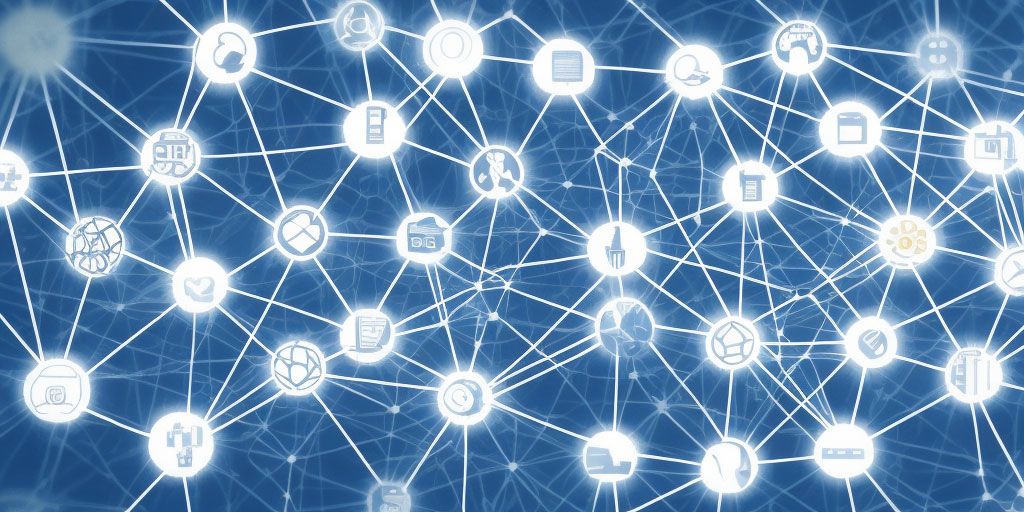Why We Need an Open Metaverse

Today, the internet operates as a centralized network of data centres owned by a few companies through which data flows to and from. The majority of online services, such as e-commerce, social media, and gaming, are provided and controlled by democratic groups of developers, creators, and users. A few influential players dominate most services and platforms.
As we move from the 2D internet to the 3D internet, it is highly desirable that we break this centralized pattern to avoid an even more powerful Big Tech. Especially as we can expect that the amount of data we generate in the metaverse will be >100x to what we create today. If this data ends up in the hands of Big Tech, they will become too powerful and control our lives even more.
As a futurist, I have discussed before that interoperability and decentralization are the key enablers of significant value for society as a whole, enabling users to seamlessly move assets (including their identity) from one platform to another and have full control over their data and digital assets. But what does this really mean? What is the difference between a metaverse constructed of open platforms versus a metaverse that consists only of walled gardens, and what lies in between? Is some hybrid metaverse possible, with both open and closed digital experiences?
The Spectrum of Open versus Closed
As it appears, the spectrum of open versus closed is not exact, but multiple layers and aspects determine how open or how closed a certain platform or experience is. One thing is clear, though: an open metaverse will deliver significantly more value than a metaverse consisting of closed platforms, let alone a metaverse consisting of a single, closed platform such as The Oasis, as portrayed in Ready Player One.
In fact, The Oasis was created, owned, and controlled by one person, which would mean the equivalent of one company owning the entire internet. Although some companies do their best to be portrayed as being the metaverse, it is not very realistic and, ideally, will never happen.
The less extreme variant is a metaverse that exists only of walled gardens, which is basically what we have today. The vast majority of organizations on the Web are centralized companies running platforms or websites, some of which have grown so big due to network effects that they are considered Big Tech.
Despite the vision of the early internet, it is currently not possible to take your data or digital assets from one website to another. You cannot download your entire Twitter history, including all your comments, likes and followers, and upload it onto Mastodon and continue your digital influencer activities. Twitter owns your data, making it very hard for you to leave because your data is worth way too much to them.
Big Tech has done very well in making a seamless user experience, including federated authentication to log in with Google or Facebook on third-party websites, thereby gobbling up even more data. Users trade their privacy for convenience; naturally, Big Tech will do whatever it can to prevent this model from changing.
The Metaverse as the Current Web on Steroids
A metaverse consisting of (many) walled gardens would basically be a more extreme version of the current Web. Since the immersive internet will result in more than 100x data collection compared to today, Big Tech will become more powerful and have more control over our lives than ever before.
It will be social media and toxic recommendation engines to drive shareholder value on steroids. If you think social media radicalized people and polarized societies in 2D, imagine what could happen in 3D. Virtual echo chambers and alternate virtual realities could fracture society, with everyone living in their own (virtual) world, reinforced by a toxic vicious circle of advertising and recommendations.
Using augmented reality, we could automatically overlay avatars to people on the street based on their race to create our own reality, further dividing society. If we want to keep our society pleasant and livable, this is the part we need to change and prevent from happening. We should move away from a shareholder model that drives toxic recommendation engines focused on keeping people engaged as long as possible to a stakeholder model that rewards all parties and considers the wider impact on society.
We should potentially prevent some applications from being launched and enable a seamless experience for users to move from one platform to the other, taking hard-earned digital assets, data, and identity with them, rewarding all those who create the value instead of just the platform owners.
Public versus Private Metaverse Experiences
Of course, this does not mean you will be able to import those assets, data, and your avatar anywhere. When it comes to virtual worlds, augmented experiences, or even digital twins, these will be either private or public and can be either permissioned or permissionless. There are three options.
- Permissionless and public: Anyone can join at any moment. You might need an account to join, but you do not have to obtain permission to join a virtual world or see an AR experience.
- § Permissioned and public: You need some approval to join a public experience or network. This approval can be given after payment or using a special invitation.
- § Private spaces: By definition, these are permissioned and secure, similar to the intranets of organizations and to how some of the largest organizations create private 5G networks.
Each digital space has its own rules, created, monitored, and enforced by its founders, owners, the community, or the wider organization. Similar to the real world, there will be a large variety of completely open, permissionless platforms, that could serve as the digital equivalent of our public squares, but also plenty of permissioned, closed private spaces, your virtual office, for example, and anything in between.
The extent to which you can import and export your avatar and identity, digital assets, and data depends on the rules and governance in place. A decentralized social media platform will have different levels of openness and permissions than a digital platform to track your health, your home, your local airport, or a government building, for that matter. Unfortunately, you won’t be able to teleport into the virtual world of the Pentagon.
Embracing Web 3 for an Open Metaverse
The platforms that embrace the Web 3.0 paradigm will use distributed ledger technologies, such as blockchains and NFTs, to give the user complete control over their data and identity. In contrast, closed platforms might focus on other benefits and prevent users from owning the value they have created while extracting as much value from the user as possible. Most Big Tech companies today, focus on value extraction instead of value creation.
Of course, an open economy driving more value than a closed economy is nothing new as the same applies to real-world economies. In the past 500 years, we went from relatively closed economies to a global, interconnected and open economy where standards, protocols, and trade agreements have resulted in economic growth for those countries open to it. One only has to look at the closed economy of North Korea to confirm that closed economies perform far worse than open economies. From that perspective, the metaverse is just history repeating itself.
However, contrary to countries, people are free to move around in the digital world and switch from one platform to another. We cannot force people to move to closed or open platforms. It is more of a Darwinian approach where those platforms that offer the most benefits to the end user will win—both closed and open platforms in a healthy Darwinian competition with each other.
An Open Economic System
I do hope that open platforms will become the norm instead of the exception, simply because of the value and benefits they bring to users and society. Wealth and influence will become trapped in a walled garden if it is truly closed. If the digital value you have created is nontransferable, it does not have any value for the wider economic system.
The best that can happen to the metaverse is a metaverse consisting of centralized platforms and decentralized communities where interoperability is possible everywhere. This does not mean there won’t be any powerful, centralized Big Tech. It does mean it will lower the switching costs for consumers or make them negligible, which will benefit both the consumer and society as organizations have to work harder to keep users happy.
An open digital economic system is the most beneficial to all parties and will bring the most value to society, though it may be less attractive to those billionaire founders who care only about their personal wealth. Some decentralized communities will be pure DAOs (Decentralized Autonomous Organizations) and be completely open. In contrast, others are centralized platforms with their own rules and regulations but where you can still import your assets that remain under your control, though not all.
Building a More Equal Digital Future
The metaverse offers us a unique opportunity to fix our past mistakes and re-create a better, more inclusive, and more equal digital future. We are at a point in history where we have a choice. We can create a metaverse where everyone can be part of unique, immersive experiences, have access to unique ways to earn a living, and have complete control over our identity, data, and digital assets, or we can stick to what we have, including all problems that come with it.
An interoperable open metaverse will enable users to monetize those assets, to sell them, borrow against them, use them as collateral, create derivatives, or rent them out. The opportunities are ample, and it will create an entirely new 24/7 economy, generating trillions of dollars in value.
However, it also brings a responsibility to us as it requires us to stand up against closed platforms that limit an open economic system and interoperability and be willing to potentially pay for services instead of sticking to free services where we pay with our data. We should vote with our data and wallet, a decentralized wallet preferably.
This article is based on an abstract of my latest book: Step into the Metaverse.
Cover image created with Stable Diffusion





